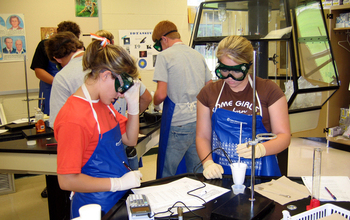Media Advisory 13-016
NSF hosts North America's first International Gender Summit, Nov. 13-15
Interdisciplinary and cross-sector partners gather from across the globe to promote greater diversity in STEM workforce and leadership

Summit promises to influence thinking about gender throughout the scientific enterprise.
November 12, 2013
This material is available primarily for archival purposes. Telephone numbers or other contact information may be out of date; please see current contact information at media contacts.
For the first time, more than 130 speakers from the United States, Canada, Mexico and across Europe will gather in Washington, D.C., for an International Gender Summit to explore the role of gender and diversity as drivers of excellence in research and innovation.
Under the leadership of the National Science Foundation (NSF) and in collaboration with the Natural Sciences and Engineering Research Council of Canada; National Council for Science and Technology; U.S. National Institutes of Health; Canadian Institutes of Health Research; Portia Ltd., U.K., and in association with the European Commission, this year's event builds on the progress established by the two previous summits that took place in Europe in 2011 and 2012.
"We are thrilled to host the first International Gender Summit in North America," said summit Chair Wanda Ward, who also serves as director of NSF's Office of International and Integrative Activities. "With three days of rich and edifying sessions, I am convinced that we will make significant progress in advancing diversity in the science and engineering enterprise across the globe."
The 2013 summit promises to leverage the international capacity to advance the knowledge base about the influence of gender on the efficacy, quality and success in promoting discovery and innovation in the scientific enterprise. This year's summit will devise a roadmap for action for North America that will serve as a model for developing similar roadmaps in other regions around the world.
The summit kicks off at 9 a.m. on Wednesday, Nov. 13 at the Washington Hilton. Program highlights will include: video addresses by Vice President of the European Parliament Oldrich Vlasak and the European Commission's Commissioner for Science Marie Geoghegan-Quinn and a keynote address by Valerie Jarrett, senior adviser to President Obama and chair of the White House Council of Women and Girls. The day's formal program will close with remarks by U.S. Congresswoman Eddie Bernice Johnson at 5 p.m.
Throughout the three-day summit, plenary panels composed of top researchers and leaders from around the world will discuss timely topics, with sessions to include:
- Demonstrating Evidence of How Incorporating Sex and Gender Consideration into Science, Technology, Engineering and Mathematics (STEM) Research and Innovation Informs Policy
- Harnessing the Gender Dimension to Address Global Scientific and Societal Challenges
- Developing Joint Policies for Innovation and Partnership in STEM Higher Education
- Incorporating the Gender Dimension Across the Research Continuum
Dozens of discussion sessions address issues such as: equity for excellence in research teams; cultivating and promoting future leaders; empowering voices of early-career scientists; integrating gender into research content and methods; and improving career-life balance.
The day's full agenda is accessible from the International Gender Summit Home Page.
For live and on-demand webcast segments over the next 3 days, visit NSF's webcast registration site.
Interviews with participants may be arranged by request. Contact: Lisa-Joy Zgorski: lisajoy@nsf.gov.
-NSF-
Media Contacts
Lisa-Joy Zgorski, NSF, (703) 292-8311, email: lisajoy@nsf.gov
Program Contacts
Wanda E. Ward, NSF, (703) 292-8040, email: weward@nsf.gov
The U.S. National Science Foundation propels the nation forward by advancing fundamental research in all fields of science and engineering. NSF supports research and people by providing facilities, instruments and funding to support their ingenuity and sustain the U.S. as a global leader in research and innovation. With a fiscal year 2023 budget of $9.5 billion, NSF funds reach all 50 states through grants to nearly 2,000 colleges, universities and institutions. Each year, NSF receives more than 40,000 competitive proposals and makes about 11,000 new awards. Those awards include support for cooperative research with industry, Arctic and Antarctic research and operations, and U.S. participation in international scientific efforts.
Connect with us online
NSF website: nsf.gov
NSF News: nsf.gov/news
For News Media: nsf.gov/news/newsroom
Statistics: nsf.gov/statistics/
Awards database: nsf.gov/awardsearch/
Follow us on social
Twitter: twitter.com/NSF
Facebook: facebook.com/US.NSF
Instagram: instagram.com/nsfgov


